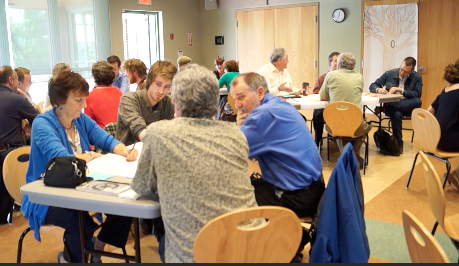For the past month, Nova Scotians have been sharing their views on ways to make democracy better in our province.
For the past month, Nova Scotians have been sharing their views on ways to make democracy better in our province. We presented participants with over 15 specific proposals to improve democracy trough an online platform. Our goal was to learn which of these proposals participants were most eager to explore deeper, and to follow through by making those issues priorities for research and community engagement at Springtide.
We held the conversation using an online platform called Ethelo, a tool for helping large groups make decisions online. The decision closed at midnight, Friday July 3rd and the results are in. We heard from a total of 264 participants.
High Priority Proposals
Some of the proposals generated very high interest with more than 90% of participants supporting further exploration. These issues included:
– a shift towards transparency and openness in the provincial government (99%),
– exploring alternatives to the first-past-the-post voting system (90%),
– empowering and improving legislative committees (93%),
– prioritizing and revitalizing civics education in schools (95%),
Low Priority Proposals
We also identified a few proposals that, while regularly discussed in the media and other forums, were the lowest of priorities for further exploration among participants. These issues generated only 50-60% of support for more discussion. These issues included:
– mandatory voting laws (50%),
– lowering the legal voting age to 16 (51%),
– implementing term limits for elected officials (59%),
What’s next
Today, we’re sharing the raw findings from our last month of engagement activity with you, the participants, and members of the Springtide community. This concludes the views sharing stage of our project. The next stage is research, learning and deliberation.
In the coming months, we’ll start research on the some of the high priority proposals identified here, and over the next year create opportunities for Nova Scotians to join their neighbours and friends, strangers and adversaries to learn, explore and deliberate on whether or not these proposed changes to our democratic system can lead to a better kind of politics. Once Nova Scotians have had that opportunity, we’ll start working on an action plan to make it happen.
Update: Research on alternatives to the first-past-the-post voting system has taken place, and is presented in this discussion paper: ‘Better Choices: Voting System Alternatives for Nova Scotia’.





